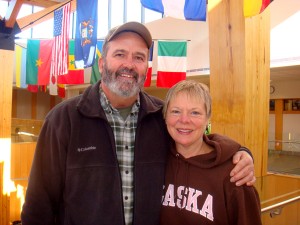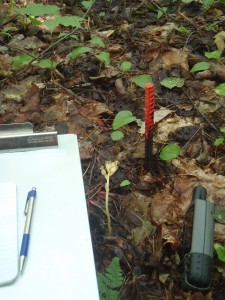Congratulations to Michael Falkowski, Shekhar Joshi, Linda Nagel, and Tom Pypker for ranking in the top 10% of the student evaluations for the question: “Taking everything into account, I consider this instructor to be an excellent teacher.”
They received scores from 4.89-5.00 on these evaluations for spring semester, 2011. Great job!!
The School of Forest Resources is saddened to learn of the recent passing of our alumnus Joe Kovach (1958 – 2011)
This obituary and picture was published in the Wausau Daily Herald on November 1, 2011

Joseph A. Kovach, 53, Wausau, died Saturday, Oct. 29, 2011, at Aspirus Hospice House in Wausau.
He was born Jan. 19, 1958, in Livorno, Italy, to Alexander and Virginia (Beatty) Kovach. Joseph’s father was a military man and, therefore, Joseph was able to travel the world as an army child. He was a graduate of both Penn State University(undergrad) and Michigan Tech where he completed his masters.
Joseph was married and divorced. He spent much time in Ecuador. He first went there as a Peace Corps volunteer from 1981 to 1983. He enjoyed it so much he later returned to work there as a forester for Baltek Corp. for eight years. It was at this time that he met and married the mother of his two children. They later settled in Wausau. Joseph worked in the Forestry Division for the DNR for 18 years as a forest ecologist and silviculturist.
He is survived by his mother, Virginia (Beatty) Kovach, Roy, Utah; son, Jesse Kovach, Wausau; daughter, Alexis Kovach, Madison; sisters, Judith Kovach, Wausau, and Kitty Kovach, Roy, Utah; nephew, David Kovach; and other loving family and friends.
Service with visitation will be from 3 p.m. to 5 p.m. Wednesday, Nov. 2, 2011, at John J. Buettgen Funeral Home, Schofield.
In lieu of flowers, donations may be sent to the Society of American Foresters and the Foresters Fund.
John J. Buettgen Funeral Home is assisting the family.

Dan Wilcox , and his wife Bev, toured the School in October of 2011. They were in Houghton to see the Garrison Keillor performance at the Rozsa Center for Performing Arts. The live in Crystal Falls, Michigan. Dan retired from the Michigan Department of Natural Resources in 2002.
Stuart Otto was just passing through the U.P. when he stopped in for a visit in September of 2011. Stuart is a 32-year employee with the Oregon Departmental of Forestry. He lives in Redmond, Oregon.
It’s always nice to have Les Reid visit the School. He stops by every other year or so. This year he was in town for the alumni reunion and celebration of his Golden M Club celebration. 2011 marks the 60th anniversary of Les’ graduation from the School and Michigan Tech.
Mark Rudnicki was in the Houghton area in July of 2011, to visit his wife’s family who live in the area. He and his wife have two sons. Mark teaches at the University of Connecticut in Storrs, CT where he is an associate professor of forest ecology in the Department of Natural Resources and the Environment.
Jim Hohnberger was a summer visitor to the School. Jim has many good memories of his time at Michigan Tech, such as great instructors and a fantastic learning environment. Jim lives in Polebridge Montana.
Forest Industry Safety Training Alliance (FISTA) trainer Lee Schaumann, assisted by Jim Schmierer conducted a Level 1 Basic Chainsaw Safety training at the Ford Center facility at Alberta, 9 miles south of L’Anse, MI for Michigan Tech students and staff on Saturday, 11/12/11. Participants learned about personal protective equipment, chainsaw maintenance, hazard awareness, safe chainsaw operation, proper notching, bore cutting, and tree felling techniques. The afternoon was spent practicing what was learned in the field in the adjacent Research Forest. Another training is planned for Spring semester 2012.
A 70-acre jack pine stand on the Michigan Tech Research Forest in the Baraga Plains that includes direct seeding trials from the 1970s was thinned in 2011 to approximately 300 trees per acre (roughly 12’x12′ spacing) to improve vigor, reduce ladder fuels and fuel loads, and improve quality. The yield was 20 tons per acre on average and included mostly chips with a few loads of pulpwood. Samples were taken pre-treatment to develop nutrient profiles of the stand that can be monitored over time. Several Michigan Tech FERM students and a visiting group from Purdue toured the timber harvesting operation.

This fall, students in FW4810 “Integrated Resources Management” (a.k.a. “capstone”) completed a wall-to-wall inventory on the Alberta and Baraga Plains tracts of the Ford Research Forest. Changes to capstone to emphasize landscape-scale assessments allowed for a unique opportunity to synergize teaching and management on our working forest. The data from the inventory will form the foundation of capstone management projects during the fall semester.
Faculty members Robert Froese and Mike Falkowski designed the inventory, and a total of 356 permanently monumented field plot centres were installed by graduate student Tim Gebuhr during August. A high-precision GPS coordinate was collected for each plot center, so the data from the inventory are also available for research applications that demand high-accuracy spatial referencing, such as remote sensing based models of forest inventory. Examples of such applications are the new Forest Biomass Information System for Michigan (http://fbis.mtu.edu).
For more information, contact Dr. Robert Froese, Director of Reserch Forests, at froese@mtu.edu.